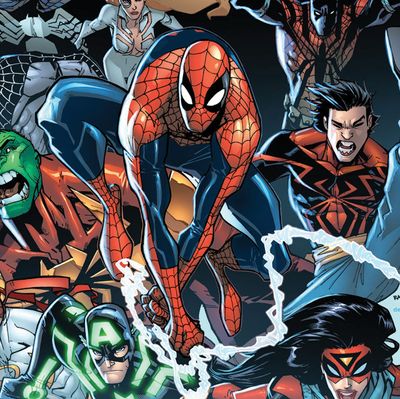
How long has Dan Slott been writing Spider-Man stories? In the immortal words of Staind: It’s been a while. The scribe began his run on Marvel Comics’ flagship series, The Amazing Spider-Man, during the 2008 story arc “Brand New Day.” Since then, he’s taken the character on some wild rides: At one point, the entire island of Manhattan got spider-powers, every Spider-Man (and -Woman) from every alternate dimension teamed up, and — perhaps most famously — the supervillain Doctor Octopus took over Spidey’s body for a while. However, the time has come to say, Spider-Man no more. After ten years and 189 issues with Peter Parker, Slott will hang up the costume after June’s The Amazing Spider-Man No. 801. But fear not, Slott-heads — he’s got another big project on the way. We caught up with Slott to talk about why he made the decision to leave the series, what he’s learned about the character, and what’s coming next.
I never thought I’d see you walking away from Spider-Man. Was this a hard decision to make?
This was a decision that was made way long ago. I gotta feel like a jerk, because whenever someone would interview me, or whenever it would come up on panels, I would look out at people and say with a stern look that I was never leaving. Very much in the same way I was saying, “Peter Parker is never coming back. I killed him” [during The Superior Spider-Man]. I lied. I lied horribly. [Laughs.] But that’s what us storytellers do, we spin lies.
At least you’re open about it.
Oh, totally. This was a long time coming. I had all these benchmarks I really wanted to hit. I was talking to [former Spider-Man writer] Gerry Conway about how long I had been on the book at one point, and he was talking about the speed with which the book was coming out. And he was going like, “You’re running a marathon.” I’m like, “Yeah, we’re running a marathon of sprints.” Because the book is coming out three times a month, or two times a month, 18 times a year. Spider-Man was coming out so rapidly. Like, when we were on the “Brand New Day” team, we had a team of four writers and I was one of them and we were doing it three times a month and we burnt through three writers and we needed to reload up with three more for the second phase. And everyone, the other guys were like, “You know, this was fun for a while, but this three-times-a-month thing was whoosh.” And I was like, “But, it’s Spider-Man!” And they’re like, “Dan, do you want to go too? Like, you know, you get four new writers.” I’m like, “No. It’s Spider-Man!”
I could always see the next furlong, I could always see what was ahead. Like, Get this far and I’ll make it to the next wave of “Brand New Day” writers, then, If I make it this far I get to one out of every five issues of [The] Amazing [Spider-Man ever published]. If I get it to this far, I get to [issue No.] 700. And so on. So I kept having these benchmarks to hit. And then I realized, once you hit ten years and then issue 800, the next benchmarks were way too far away. [Laughs.] So I always knew that was the zone. Anyone who follows my Instagram account, every now and then I would post these cryptic numbers from my whiteboard. This running tally, of which, that tally starts in like, July 10th of 2014, where I knew what I was counting down to and no one else knew what I was counting down to. I wanted to lock that in so I could prove I wasn’t lying.
So 2014 was when you did the math and realized that sometime around 2018 you’d be stepping off?
It was also around the time that we were doing “Spider-Verse,” and it was such a big undertaking. It was the research you had to do, reading all the different Spider-Men of all the different iterations. And because we were working with two artists who were going in two different speeds, and also we had so many tie-ins from so many other writers where they needed to know how certain issues ended, all of “Spider-Verse” was written out of order. There were no two issues that were plotted in a row.
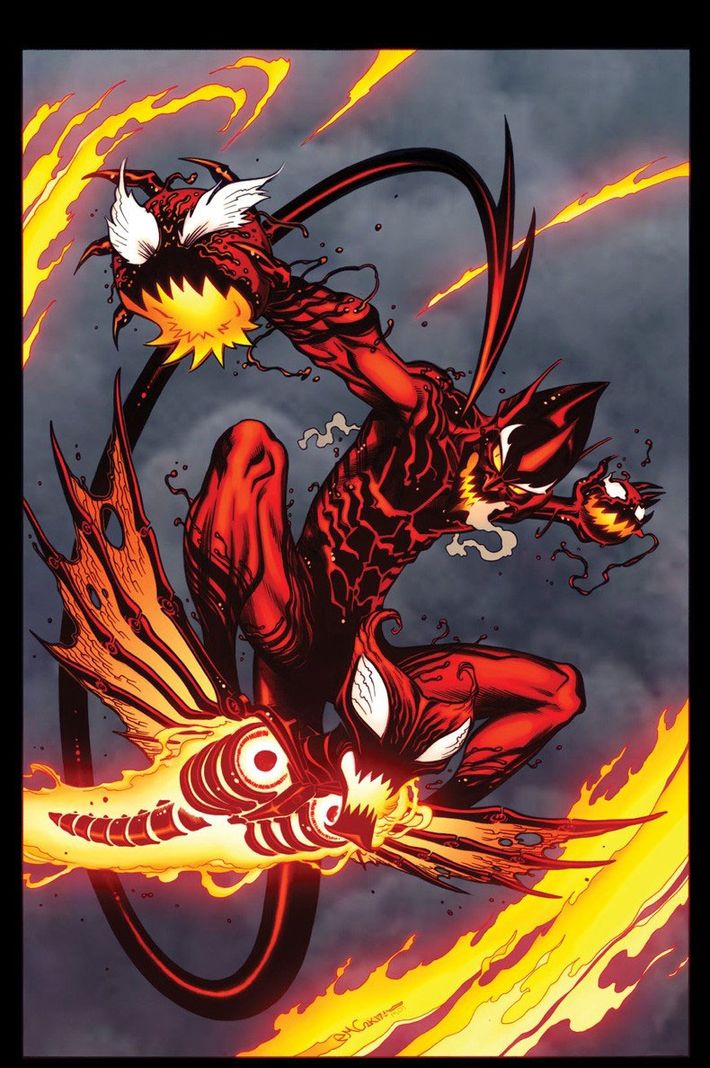
Yikes.
[Laughs.] Yeah. And in the middle of all of that I was like, Aaaaaah. That was it. I was very much aware of, like, Okay, I think something inside me broke. But I am going to make this, man. If Spider-Man can lift that heavy thing off his back, I can do this.
And that old heavy-lifting story was called “The Final Chapter,” so hey, it all comes full circle. Were there times in that three-year span since 2014 when you started to go, Maybe I should keep going even longer? Or were you pretty dead set that whole time on finishing around when you’re now finishing?
This was pretty much my end game, was to hit 800. Well, not … We’ll get to it in a bit, but not really 800 but 801. And there’s a reason for that. I have all this math worked out where you hit this number you get to there, you do this you get to there. Eight-oh-one is special for me, and I wanted to get to there. There was only one benchmark left that I could hit and it felt forever away, and that was more issues of any Spider-Man comic than anyone. That was the one benchmark that was very much dangling out of reach like Tantalus. The reason why was Brian Michael Bendis. [Editor’s note: Bendis currently holds the record for most issues written of any Spider-Man comic, thanks to his runs on Ultimate Spider-Man and Spider-Man.] He kept writing, so it was a moving benchmark, and I just assumed he was never leaving. If I had known, if I had only known that Brian was gonna jump to DC I would’ve stayed on. [Laughs.] I bet you I would have stayed on.
That’s funny.
Yeah, I had already told everyone like, three or four [Marvel creative] retreats ago and already cleared it with Marvel so they could get another writer ready and all the machinery was in motion. And Brian left and I was like, Nooooo. That put it within reach! Like, climbing all the way up to Everest and seeing someone else’s flag up there and going, I’m like 20 feet away, but I’ll turn around and you head back home. But, you know, there’s … for this master plan to work, it doesn’t have to be Amazing Spider-Man. Who knows? Like, two, three years from now, I could go back and go, “Hey, let me do Web of Spider-Man. Let me do a new version of Untold Tales of Spider-Man.” I just gotta hit that for 18 or 20 issues and we’re good.
It’s hard to imagine you not writing Spider-Man at this point. I mean, what’s that gonna be like? Is it like losing a limb?
There are days where everything gets seen through the Spider-Man filter first. If I’m walking down the streets in New York and I notice something, I’d go, Oh, how would Spider-Man deal with that? It’s a reflex muscle in the back of your head. Or you read a news story. Something happens and you go, How would Spider-Man deal with that? What is that? What if that was Mysterio? When you do this for ten years, that’s just the way you’re wired. The flip side is when I went from “Brand New Day” to “Big Time,” then-editor Steve Wacker, when he made the offer to me like, “Would you like to be the solo writer?” he gave me the offer on one condition and that was that this would become my full-time job; that I would give up Mighty Avengers. And all I would be writing — morning, noon, and night — would be Spider-Man. And I had all of, like, 40 minutes of indecision about that. It was over a lunch and I told him I was going to need time to think about it. And he was walking back up to Marvel, and I was walking home, and I called my dad and I asked him what I should do and he was like, “You’ve wanted this your whole life.” I’m like, “Oh my God. Dad, you’re right.” And hung up on my dad and I called up Wacker. He hadn’t even made it back to Marvel. It wasn’t until Silver Surfer that I got to take a different scoop of ice cream, where it wasn’t all chocolate and, “Oh, hey, what do you know? Sherbet!”
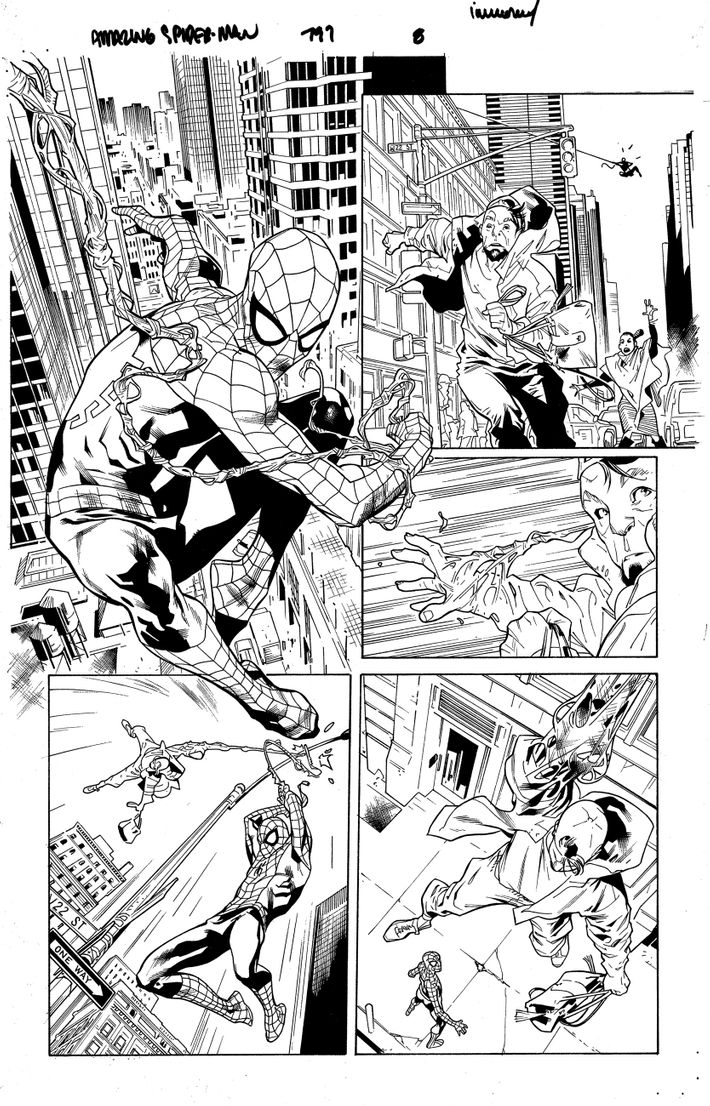
And Surfer is over, too, so you’re really entering uncharted territory now. It’s all new.
It’s not uncharted, Abraham.
It’s not?
We know where we’re going. We’ll get there. It was like I had a different flavor with Surfer and that just kinda cinched it. It’s fun to have the different flavor, it’s fun to do the different thing. One of the neat things about this is when you are writing Amazing, you start finding out you are part of a fraternity. A good one, not one of those creepy Skull and Bones ones, but this fraternity of Spider-writers. And you’ll do a panel with some Spider-Man writer of old and you have so many stories you can swap back and forth with each other and notes that you really need to take, because these are guys who’ve gone down the path first. I just had the best talks with Gerry Conway, and with Roger Stern, and all these different guys. [David] Michelinie, [Tom] DeFalco. And one after another, there was a common denominator, there was a common bit of advice they would all give, which, to paraphrase it, was, “Don’t leave. If you get a chance, you ride that as long as you can. Don’t leave.” It made me go, “Wow, okay. I am taking this to heart. I’m gonna go as long as it’s fun and just enjoy it.”
What have you learned about the character over the course of your ten years of writing him? What are some crevices or nuances that you weren’t really aware of until some point during your run?
A lot of people have one take on Spider-Man. They go, “When he’s Peter Parker, his life is terrible and he puts on the costume and then it’s this great release and he gets to swing through the skies and be Spider-Man.” And other people have this take of, “His Peter Parker life would be so much better if he didn’t have to become Spider-Man. Spider-Man is a curse.” You start realizing, just the way you’re not the same person every day, Peter Parker and Spider-Man aren’t the same person every day. They have so many different flavors, they have so many different facets. There is no one way.
When I grew up, one of my favorite books was Marvel Team-Up. And in that book, Spider-Man would be with Adam Warlock on the moon. And then the next month he’d be with Doctor Strange in a mystic dimension. And sometimes you’d have people write stories where they want you to believe that Spider-Man is only a street-level character. You know, Spider-Man can do anything. Spider-Man can go anywhere. What it is, is he brings that street-level sensibility and that sense of humor with him. That if you make him the fish out of water, he’s still Spider-Man. It’s how he deals with that weirdness. So many people were so upset about Peter Parker’s CEO arc of “Worldwide”: “That should never happen to Spider-Man.” And to me, the fun of it is, what if it did? How would Peter Parker react to that? And the one advantage I had was, I knew it wasn’t going to last forever. I knew I was going to knock the legs out from under him and knock him down even lower than before and get back to that core Peter Parker. I knew what was coming up. So that gives you the freedom to do weird things. To swap brains with Doc Ock, to make him work at high-tech lab, to whatever you want, really, as long as you know you’re going to put the toy back in the box.
I always wonder about this with comics writers, is there something frustrating about the fact that you do have to put the toy back in the box and that some version of the status quo has to return? That you can’t fundamentally change the character? Is there some part of you that wishes you could really shake up the status quo permanently?
I’m not that selfish. I think you do have to, every now and then, refresh and restart. Every now and then, you do have to go back to ground, because every generation deserves to have Spider-Man with them. He’s one of the greatest characters of all time, of all of fiction. If some 8-year-old kid is growing up now, he deserves to have Spider-Man go on the journey with him. It feels kinda selfish to go, “No, Spider-Man should age just with my era, and he should track with me, and he should go through these moments with me. And then he should grow old and then he should die.” No, it’s important that everyone has a shot to have Spider-Man be their Spider-Man.
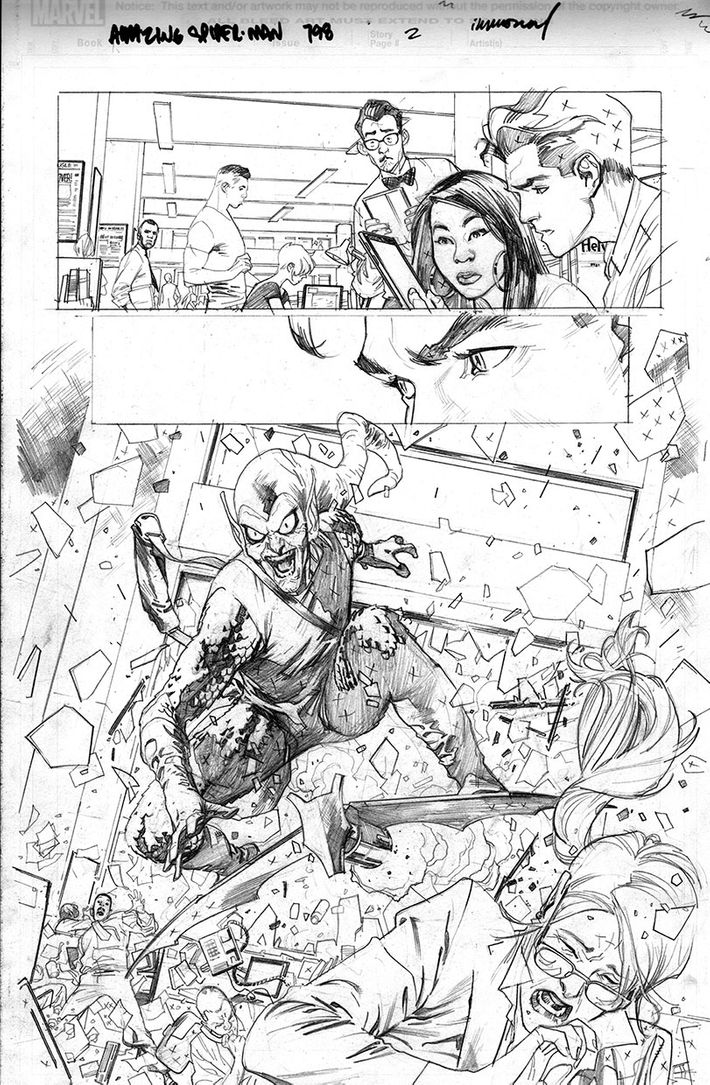
So, we can’t get into much detail I would imagine, but what’s next?
Oh, we’re jumping all the way to end, eh?
Well, no, we can come back to Spider-Man.
Good. I’m gonna feel like a dick if I don’t go, “Thank you, Steve Wacker. Thank you, [editor] Nick Lowe. Thank you, all these writers and artists.” Can we save the “what’s next” until the very end?
All right, all right. Do you have a particular favorite Spidey story among the ones you’ve written?
Ooh, that’s horrible because you’re supposed to go, “I love all my brothers and sisters equally. I love all my children.” But, yeah, of course, you’re gonna have favorites. I really love the story line, “No One Dies,” with Marcos Martín because we touched on so much Spider-Man history and put it into this cohesive story about how Spider-Man feels about every time he fails to save someone. The artwork on that was so gorgeous. And working on that two-parter was just such a highlight that while we were working on it, I made Marcos Martín make me a promise that he would come back and do my last story when it was time to end. And that was many years ago, because I already knew what my last issue was and I ran the story by him even back then and he was like, “Okay, I will come back for that. If I leave, I will come back for that.” And that’s 801.
Ooh, enticing.
Yeah, but there’s so many I loved doing. I loved the whole “Dying Wish” arc and how much it freaked everyone out. And just the labor of love that Humberto Ramos put into that, especially the giant-size 700. I loved working on “New Ways to Die,” with John Romita Jr., because he’s John Romita Jr., for God’s sake. The final Superior arc with Giuseppe Camuncoli, the “Domination.” I’ve been spoiled working on these books, in that, for ten solid years, I got to work with the best people in the industry. Some of the nicest people, too. The most talented. Whether it was some of the guys I mentioned, or [Mike] McKone, or [Barry] Kitson, or Ryan Stegman, or Adam Kubert. So much of the entirety of what I’ve done has been with Humberto. That man’s amazing — how much he does and how well he does it. You could have easily done a book with Humberto Ramos without dropping a stitch that could run twice a month. He could do two issues a month on his head.
Wow.
Yeah. People do not realize the amount of — not just talent but dedication and drive that he has. He will hit that deadline, damn it. Giuseppe Camuncoli is in the same boat … he will break himself. He will be bent over that art board. He’ll be, like, breaking his wrists. He’ll be doing whatever he can to get everything in. This was a daunting book because it’s not just Marvel’s flagship, it also has to come out at an accelerated pace and never miss a deadline. That takes people’s candle and burns it down to the wick. You have no idea how much blood goes into this book.
Along those lines: It’s no small responsibility to be the premier writer for one of the most famous characters in superhero fiction. How do you not let that pressure get to you?
Oh, you do. You do let it get to you, and you do let it drive you crazy. What you do is you have these very wonderful editors like Steve Wacker and Nick Lowe, who then have to also act as your counselor. On top of everything else, they have to walk you off of every crisis and calm you down and get the pages out, and then, other days, they have to crack the whip and tighten the vise. If you’re gonna be an editor on the Spider-Man book it takes a superhuman ability, and Wacker and Lowe just killed on this.
How do you think you’ve grown as a writer over the course of those ten years?
Waistline. This is how I’ve grown. [Laughs.] Yeah, it’s really been an honor. There is that part of me that would like to keep going because I’d like to call it the salad days, but as I just said, there was no salad involved. This is the best job I’ve ever had, doing something I very much love. And there’s that point where you just have to be grateful for everyone that you’ve gotten to work with and everyone who’s decided not to pull you off a book. Whether it’s [former editors-in-chief] Joe Quesada or Axel Alonso, or just … yeah. That was a weird thing, to go to Axel and say, “Yeah, this is when I’m leaving, I think,” because he was very nice. And when [new editor-in-chief] C.B. [Cebulski] was brought on, the day everyone found out the news, I got a call from him within five minutes of seeing it. Like, “What?” And he was like, “So, you know, I’ve talked with everyone. I heard you’re now going to be on this. I think that will be a great book for you.” And I was like, “Okay, cool.” So, yeah, I was kinda scared because it was like, “Oh, I’m leaving Spider-Man and we have the next book lined up, but now here’s a new EIC.” And he was okay with me going to that book.
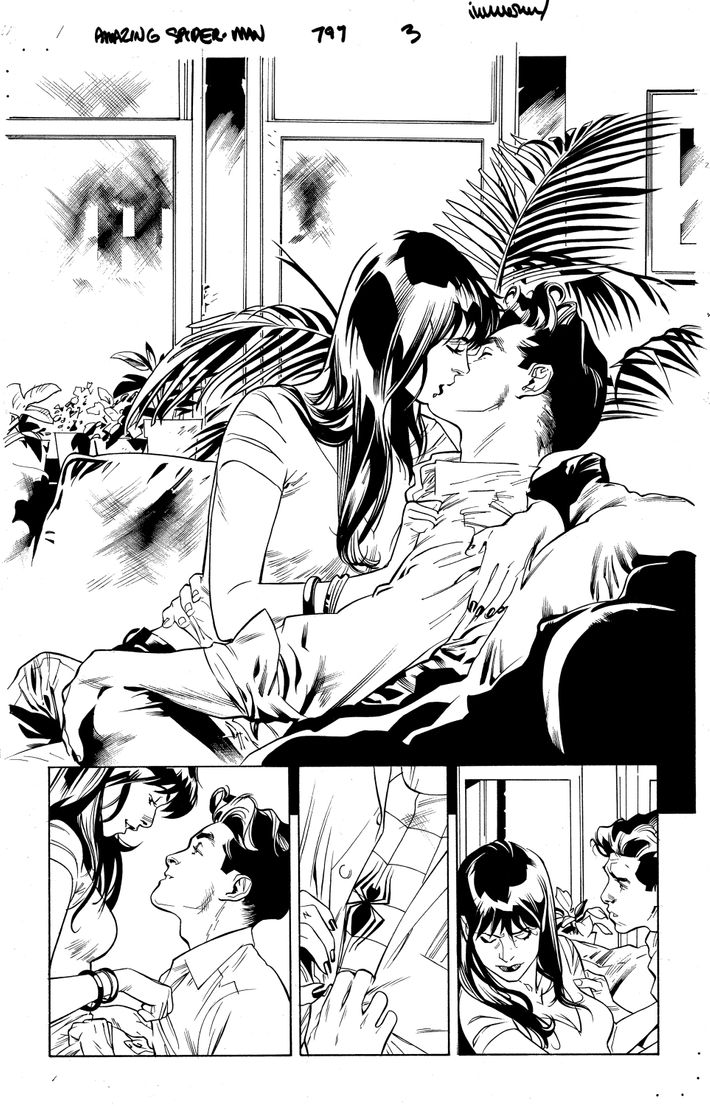
Speaking of which: Now, can we talk about what’s coming next?
Sure. I am going from the flagship character of the Marvel Comics of my youth to the gem of the Marvel Cinematic Universe. The linchpin. I am going to Iron Man.
Hey, now!
Yeah! Tony Stark: He makes you feel; he’s a cool exec with a heart of steel. I’m all excited. They’d asked me to do Iron Man a while back, but by then I was at Surfer and I had Spidey and I was already overcommitted, so it kept gnawing at me. Like, Oh, man. I really do want to do Iron Man. This would be fun. And when that came around again, it was like, Okay, yeah. Yeah, yeah, yeah, yeah, yeah, yeah. I want Iron Man. I want this. I want this really bad. I grew up in a world where you could ask a layman on the street, you could ask the guy in the deli carving the meat, you could ask anybody, “Who’s Clark Kent?” and they could go, “Superman.” Who’s Bruce Wayne?” “Batman.” “Who’s Peter Parker?” “Spider-Man.” And that was about it. And now, we live in a world where people know Tony Stark is Iron Man. Everyone in the world knows who this character is, and everyone in the world knows who Tony Stark is. This is Tony Stark, Iron Man. This gonna be about technology in the Marvel universe in a very specific way and it’s gonna lead to very big things.
What makes Tony an interesting character to you?
Reed Richards explores the universe. He wants to know everything and go everywhere. Tony Stark builds the future. It’s not that he’s not out to discover the next big thing. But he’s gonna take his own two hands and he’s gonna build where he wants to go, or what he wants to do. He looks at a challenge and goes, “How do I machine my way out of this?” When you’re a kid reading comics, there’s a feeling like, if you really wanted to, you could be Batman. You could dedicate your life, you could train and train and train, and you could be Batman. And you read Marvel books and there’s a feeling like, “If you did get superpowers, you would be Spider-Man. You’d be that guy, you’d be Peter Parker. Peter Parker is the guy like you.” Tony Stark is somewhere in between, in that we are not all that kind of … How often is there that level of genius in any person? But more than any character in the Marvel universe, he is the self-made man. You take him out of that suit? He’s a normal man. He makes himself the superhero. He makes himself into the thing he wants. There will be a very unique cast in this book of characters: Iron Man characters you love and Marvel characters that you haven’t seen folded into the Iron Man cast. So, at the end of the day, there’s Captain America with super-soldier serum, and there’s a god of thunder, there’s all these characters around him with these amazing abilities. But his abilities came from his own two hands. He made it, and he stands amongst the gods because of what he can imagine and what he can make. That’s exciting.
This interview has been edited and condensed for clarity.

